After the best sunscreen for acne-prone skin? As blemish-prone beauty editors, these 10 didn't break us out once
If your skin breaks out at the mere whiff of an SPF, read on

Laura Mulley
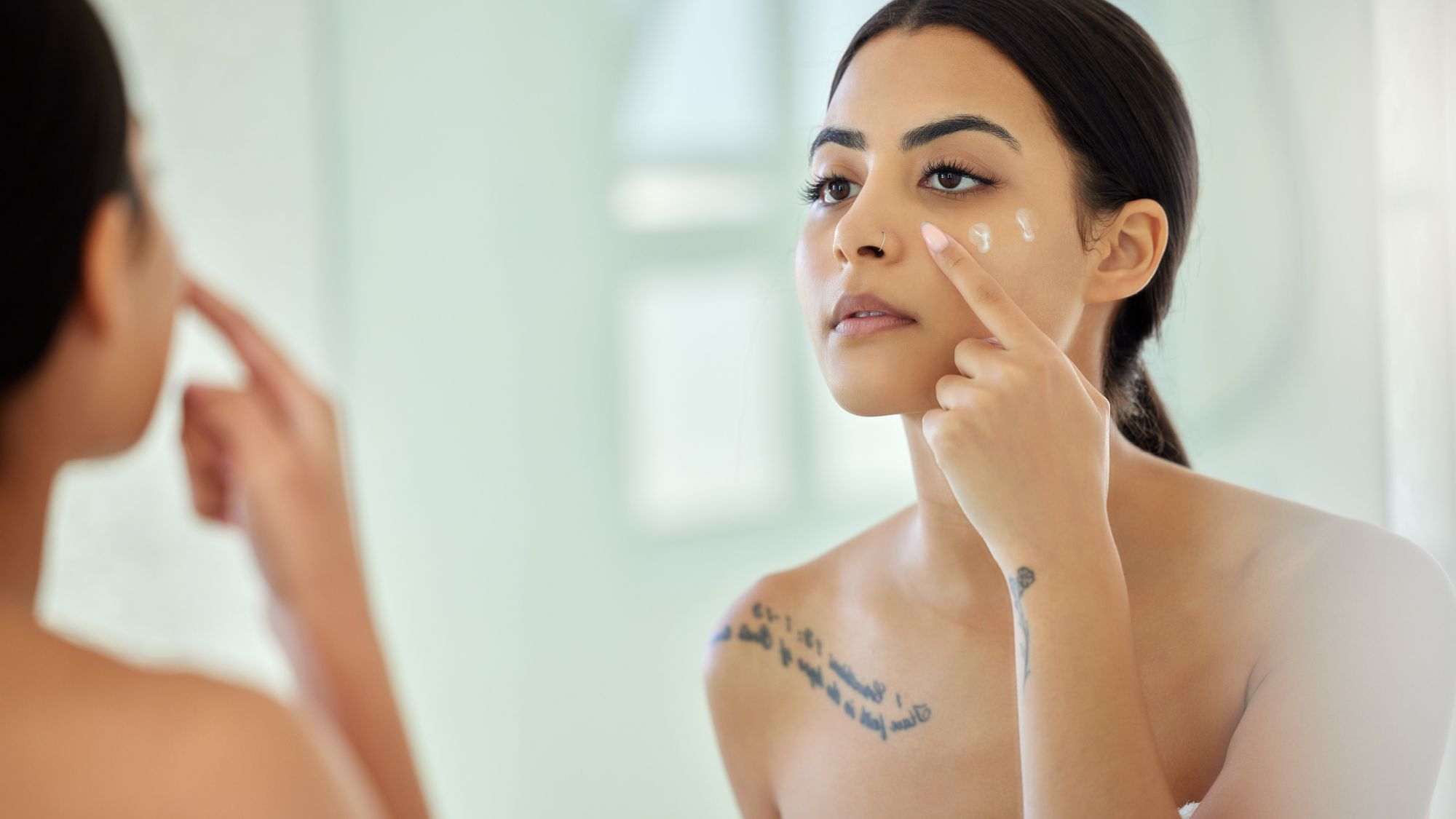
Celebrity news, beauty, fashion advice, and fascinating features, delivered straight to your inbox!
You are now subscribed
Your newsletter sign-up was successful
As a beauty editor with acne, I'd like to first state that I know the perils of trying to find the best sunscreen for acne-prone skin all too well. You can settle on the best acne treatment, find the perfect skincare routine for acne and become an expert in how to pop a pimple, but slapping on the wrong sunscreen can undo all of your hard work overnight.
So yes, trust me when I say that I know just how tricky it is to find an SPF that doesn't make acne worse. You see, by their very nature, even the best facial sunscreens risk clogging pores. And a pore-clogging product is typically never a good thing for acne. Finding a sunscreen that doesn't break you out can feel like such an impossible task that you're left questioning the importance of it and wanting to sack it off altogether.
But after many years absorbing intel from some of the top skin experts in the world, I need you to hear me now: you need to be applying sunscreen to your face every damn day—even if you have acne-prone skin. Not only does sunscreen help protect skin against sunburn-inducing UVB rays (one of the main causes of skin cancer), it also protects skin on overcast, cloudy days from skin-damaging UVA rays (which contribute to signs of premature skin ageing). On top of all of this though, sunscreen application for acne-prone skin specifically is particularly important.
Best sunscreens for acne-prone skin 2024 - at a glance:
- Best sunscreen for acne-prone skin that absorbs quickly: La Roche-Posay Anthelios UVMune 400 Invisible Fluid SPF50+ | £16 at Lookfantastic
- Best sunscreen for dry acne-prone skin: CeraVe AM Facial Moisturising Lotion SPF50 | £13.20 at Lookfantastic
- Best sunscreen for acne-prone skin with zinc oxide: Ultra Violette Lean Screen Mineral Mattifying Skinscreen SPF50+ | £34 at Lookfantastic
- Best lightweight suncreen for acne-prone skin: Glossier Invisible Shield | £25 at Glossier
- Best sunscreen for acne-prone skin recommended by dermatologists: Heliocare 360 Oil-Free Gel SPF 50 | £21.70 at Amazon
- Best sunscreen for acne-prone skin that gives a healthy glow: Vichy Capital Soleil UV Age Daily SPF 50+ Invisible Sun Cream with Niacinamide | £18 at Lookfantastic
- Best sunscreen for acne-prone skin with a mattifying finish: SkinCeuticals Oil Shield UV Defense Sun Cream SPF50 | £40 at Lookfantastic
- Best SPF moisturiser for acne-prone skin: Mecca Cosmetica To Save Face SPF50+ | £16 at Mecca Cosmetica
- Best sunscreen for acne-prone skin and pigmentation: Ultrasun Anti-Pigmentation Face Fluid SPF50+ | £22.40 at Face the Future
The importance of sunscreen for acne-prone skin
When the sun's out, it's easy for those amongst us with acne to want to skip sunscreen altogether in the hope it might help clear up our breakouts—and this isn't technically bad logic. "UV will actually often improve acne in the short term because it suppresses the immune system in the skin which is responsible for inflammation," reveals Dr Emma Wedgeworth, Consultant Dermatologist for La Roche-Posay.
So if you've noticed your acne gets better when the sun's out, you're not imagining it. "People often report their skin being better in the summer or after a summer holiday," adds Dr Susan Mayou, Consultant Dermatologist at the Cadogan Clinic.
Despite the fact there is truth in this, as a blanket rule, most dermatologists say this isn't worth forgoing SPF. "We know that, long term, UV causes significant ageing of the skin and increases the risks of skin cancer, so it's very important to keep protecting the skin," adds Dr Wedgeworth.
And there are three very important reasons you should be particularly stringent with sunscreen application if you have acne-prone skin.
1. Acne products cause increased sensitivity
First and foremost, it's worth noting that acne products in general (from the best acne face wash to the best spot treatments) are prone to making the skin more sensitive to damaging UV rays. So, if you're using acne-specific products (we should always be tailoring our skincare routine to what our skin needs, after all), it's more important than ever to apply sunscreen.
Ingredients that can make the skin more sun-sensitive include anything that increases skin-cell turnover, such as acids and retinol. "Many acne-targeted products gently exfoliate the skin, causing increased UV sensitivity," warns Dr Alexis Granite, CeraVe consultant dermatologist.
If you're using prescription-based acne treatments, applying sunscreen every day is imperative. "If you are taking oral medication, such as Roaccutane, or using topical prescription treatments such as retinol, your skin can become particularly sensitive to UV radiation and increasing the risk of burning," says Dr Mayou.
And this isn't just important for your face, either. In fact, body acne (whether it be on your back, chest, neck or bum) also needs protecting from the sun, particularly if you're treating it with an acne body wash.
2. UV rays can worsen pigmentation and scarring
If your skin is prone to acne, chances are you're familiar with the perils of acne scarring—and UV damage can risk making things worse. "UV exposure may increase post-acne pigmentation," says Dr Wedgeworth. "It also contributes to collagen breakdown, which may further exacerbate atrophic scars (the dips and pits that can occur with acne scarring)." Yep, you can be armed with the best acne scar treatment out there, but SPF is still going to be your best bet.
It's worth noting too that pigmentation that occurs after acne is particularly prevalent in melanin-rich skin. Cosmetic doctor, and co-founder of Victor & Garth, Dr Lauren Hamilton explains, "Exposure to UV can lead to post-inflammatory hyperpigmentation—this is when dark patches occur following injury or irritation to the skin such as when acne has formed. Whilst it is temporary, it can take longer to fade in darker skin. Darker skin is more susceptible to post-inflammatory hyperpigmentation due to the stimulation of melanin production following tissue injury."
3. Increased oil production can exacerbate breakouts
Okay, this one is less of a reason that SPF application is important for acne-prone skin, and more just something to be aware of. If you find that your skin breaks out more when you apply SPF, there is reason for it. "Sun exposure causes the body to sweat as a mean of naturally cooling the body. This can contribute to occlusion of follicles, which is exacerbated by sunscreen, resulting in a predisposition to blackheads, whiteheads and papules," warns Dr Mayou.
And look, I get it, it's really, really annoying that sunscreen and hot, sunny days can often make acne worse. But I promise you there are ways to avoid sunscreen-induced breakouts—you just have to know what to shop and how to apply it.
Important things to remember
- "Apply SPF50 every day, regardless of the weather forecast, to get the best protection," says Dr Mayou.
- "Keep an eye out for products that contain zinc oxide as it's tolerated by most skin types," says Dr Hamilton. "Although, mineral SPF can leave acne-prone skin congested, so you may be better suited to a chemical sunscreen."
- "Look for lightweight or gel-based formulas that are oil-free and non-comedogenic," advises Dr Mayou.
- Above all, avoid oil-based formulas and pore-clogging sunscreen sticks that may make your congested skin worse.
Best sunscreens for acne-prone skin
To save you the trial and error of shopping for the best sunscreen for acne-prone skin, I've made it my mission to find the best of the best (that won't exacerbate breakouts). After speaking with the experts and with many, many years of testing sunscreens on my acne-prone skin under my belt, I'd say I'm in a pretty good place to deliver the best formulas out there for complexions plagued by acne.
I paid close attention to price, formulation, ingredients and ease of application. (Read more about how we test our products here.)
1. La Roche-Posay Anthelios UVMune 400 Invisible Fluid SPF50+
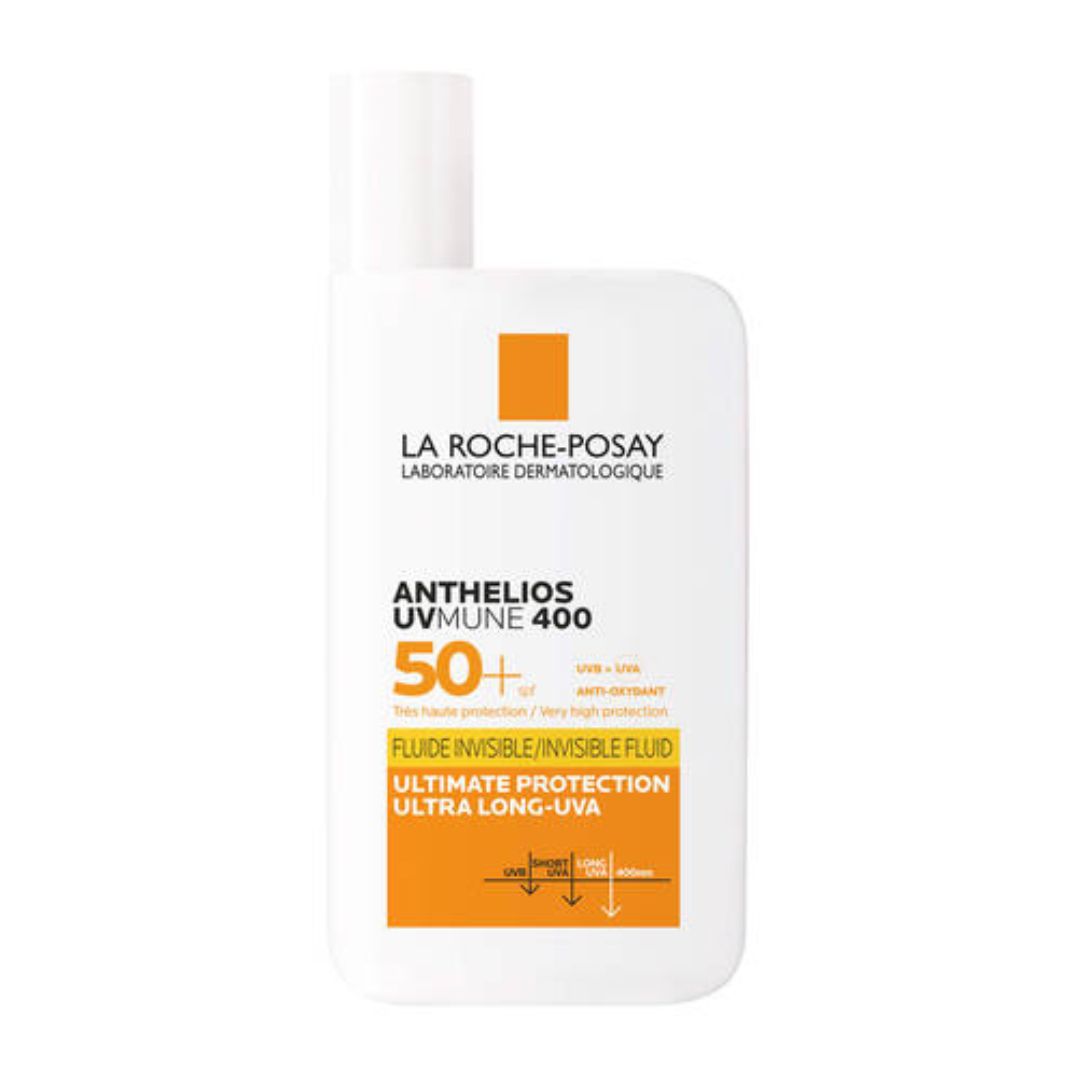
La Roche-Posay Anthelios UVMune 400 Invisible Fluid SPF50+
Reasons to buy
Reasons to avoid
"In my 8+ years in this job, I'm not sure I have ever encountered a dermatologist, skin expert or beauty editor who doesn't consider this to be one of the best facial sunscreens ever created. Its non-oily, lightweight texture sinks into skin in seconds, making it the perfect sunscreen for acne-prone skin." - Shannon Lawlor, Executive Beauty Editor
2. CeraVe AM Facial Moisturising Lotion SPF50

CeraVe AM Facial Moisturising Lotion SPF50
Reasons to buy
Reasons to avoid
"I always recommend this facial sunscreen for those with slightly drier, acne-prone skin thanks to its intense hydrating properties. And although it's thicker than most of the other formulas on this list, that's not to say it's not good for acne-prone skin. It's non-comedogenic (meaning it doesn't block pores), is fragrance free and contains niacinamide to help regulate oil production. It's so good, in fact, that it's one of Dr Granite's go-to recommendations." - Shannon Lawlor, Executive Beauty Editor
3. Ultra Violette Lean Screen Mineral Mattifying Skinscreen SPF50+
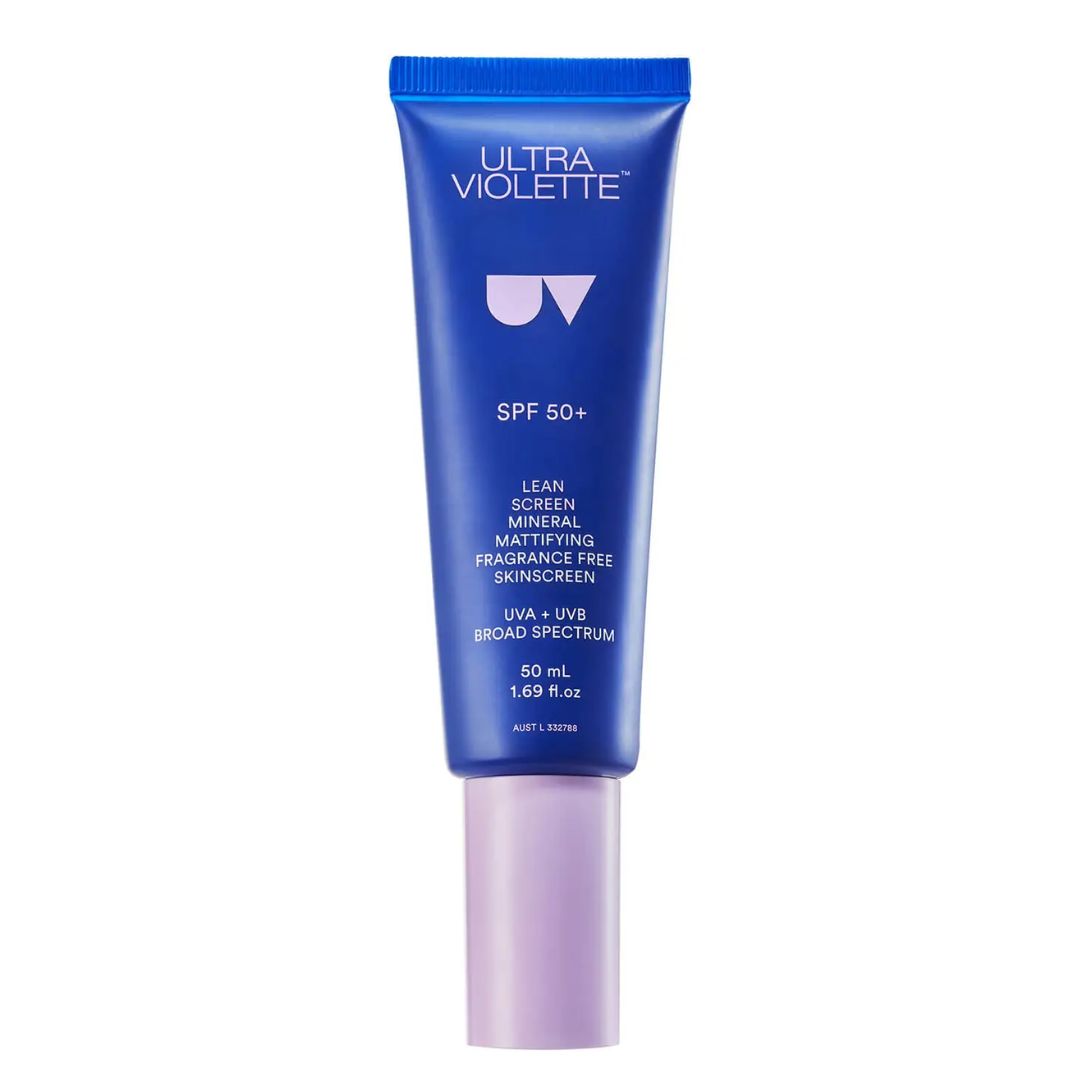
Ultra Violette Lean Screen Mineral Mattifying Skinscreen SPF50+
Reasons to buy
Reasons to avoid
"The thing that really sets Ultra Violette sunscreens apart from the rest is just how wearable they are. Feeling much like a daily moisturiser, it's hard to believe that this stuff also contains super-high sun protection. It's a mineral formula, but by championing universally tolerated zinc oxide, it's one of the rare mineral SPFs that shouldn't exacerbate acne. Note too that it's common for zinc-oxide sunscreens to have a slightly red colour—this isn't pigment and will settle on every skin tone." - Shannon Lawlor, Executive Beauty Editor
4. Glossier Invisible Shield
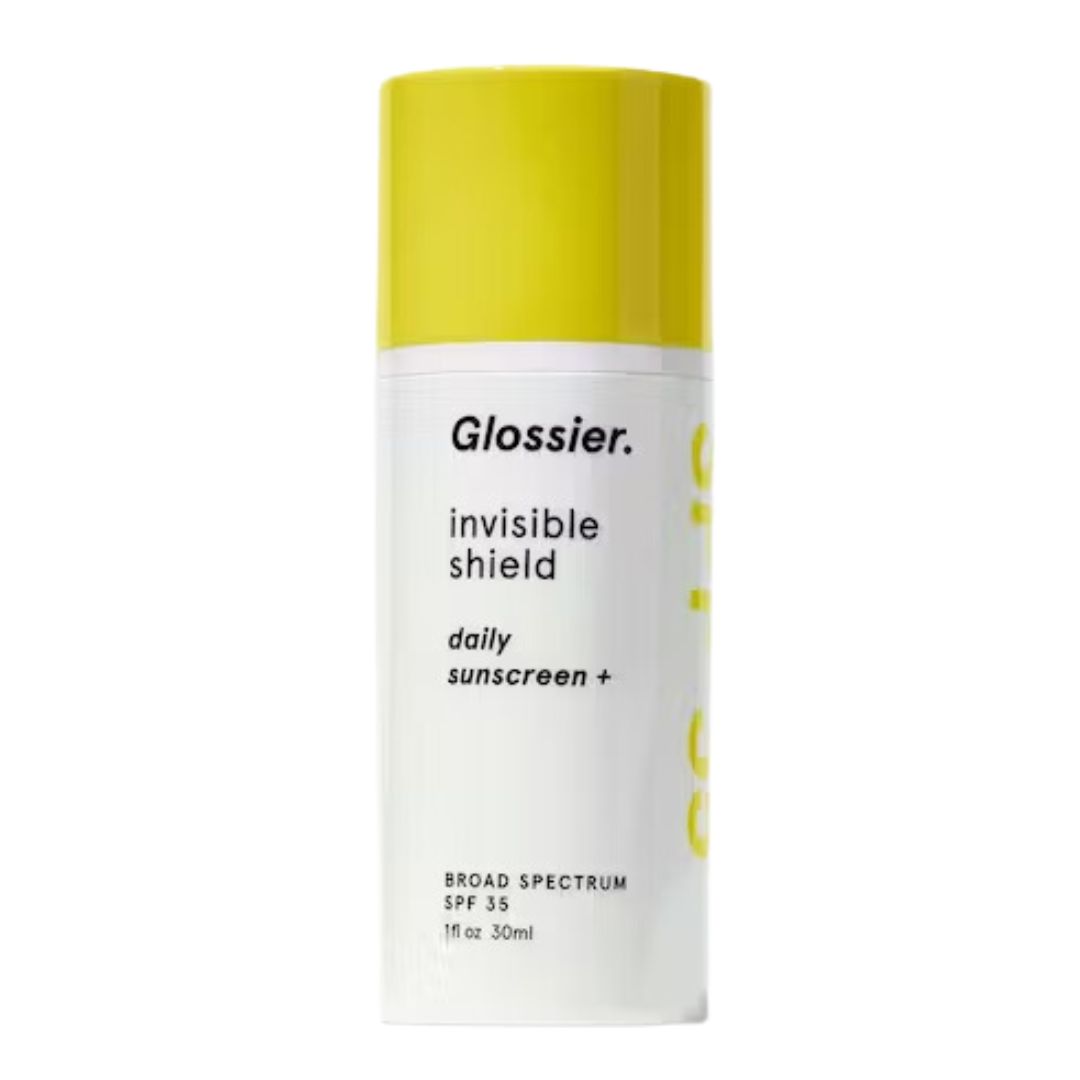
Glossier Invisible Shield
Reasons to buy
Reasons to avoid
"When it comes to sunscreens that work well under make-up, look no further than Glossier Invisible Shield. If ever I'm having a fuller make-up day (and by this I mean I apply a base), this is the first SPF I'll reach for. It a water-gel texture, it applies like silk, leaving skin feeling almost impossibly smooth. if you're someone that hates the way SPF feels on their skin, I urge you to give this a go." - Shannon Lawlor, Executive Beauty Editor
5. Heliocare 360° Gel Oil-Free SPF50
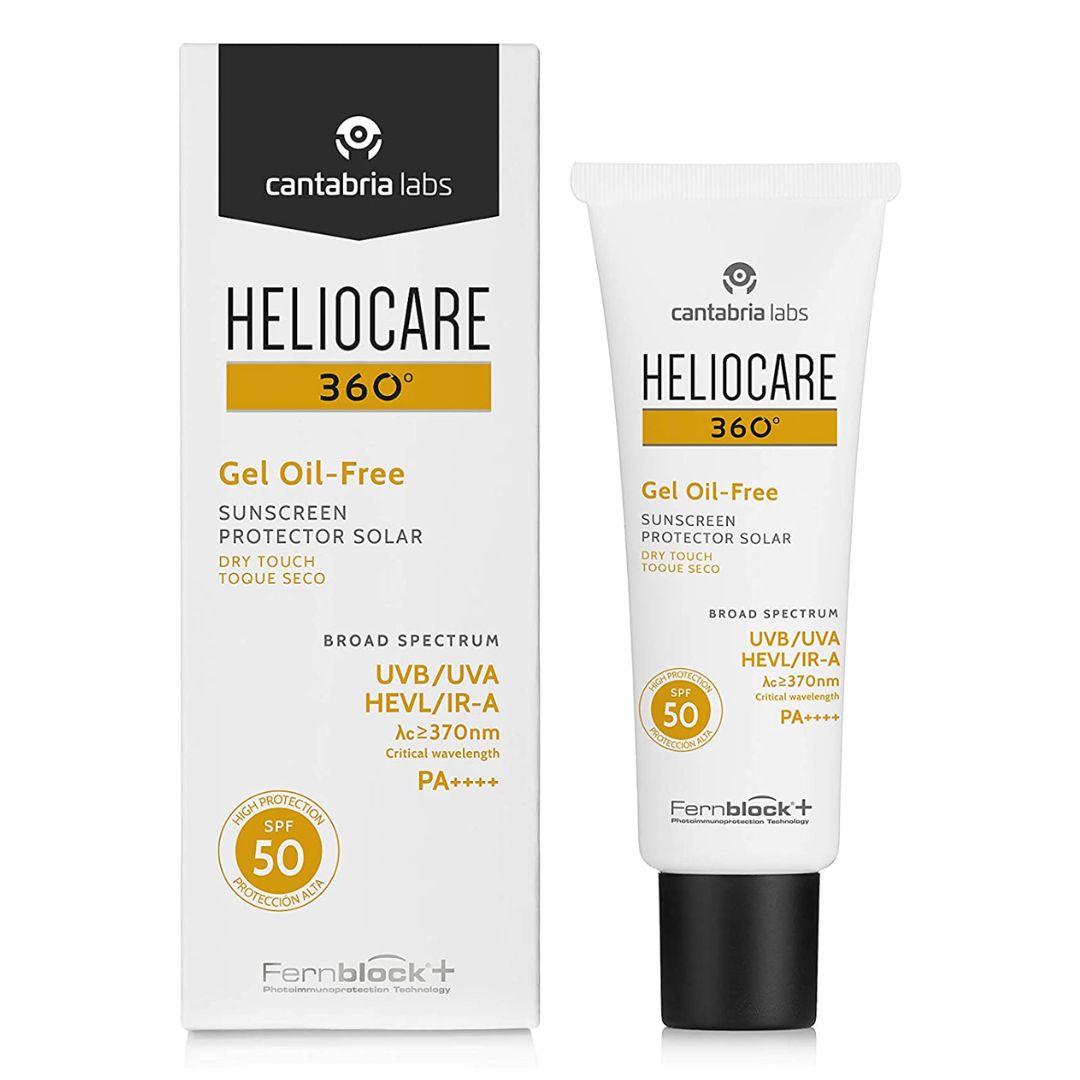
Heliocare 360° Gel Oil-Free SPF50
Reasons to buy
Reasons to avoid
"Of all the sunscreens I have been recommended by dermatologists and aestheticians, this one from Heliocare has been the most consistent recommendation. Experts have long loved this formula thanks to its oil-free nature and matte finish, which make it the perfect SPF choice for acne-prone skin. While I've personally tried a number of sunscreens over the years, this is the one I come back to time and time again." - Shannon Lawlor, Executive Beauty Editor
6. Vichy Capital Soleil UV Age Daily SPF50+
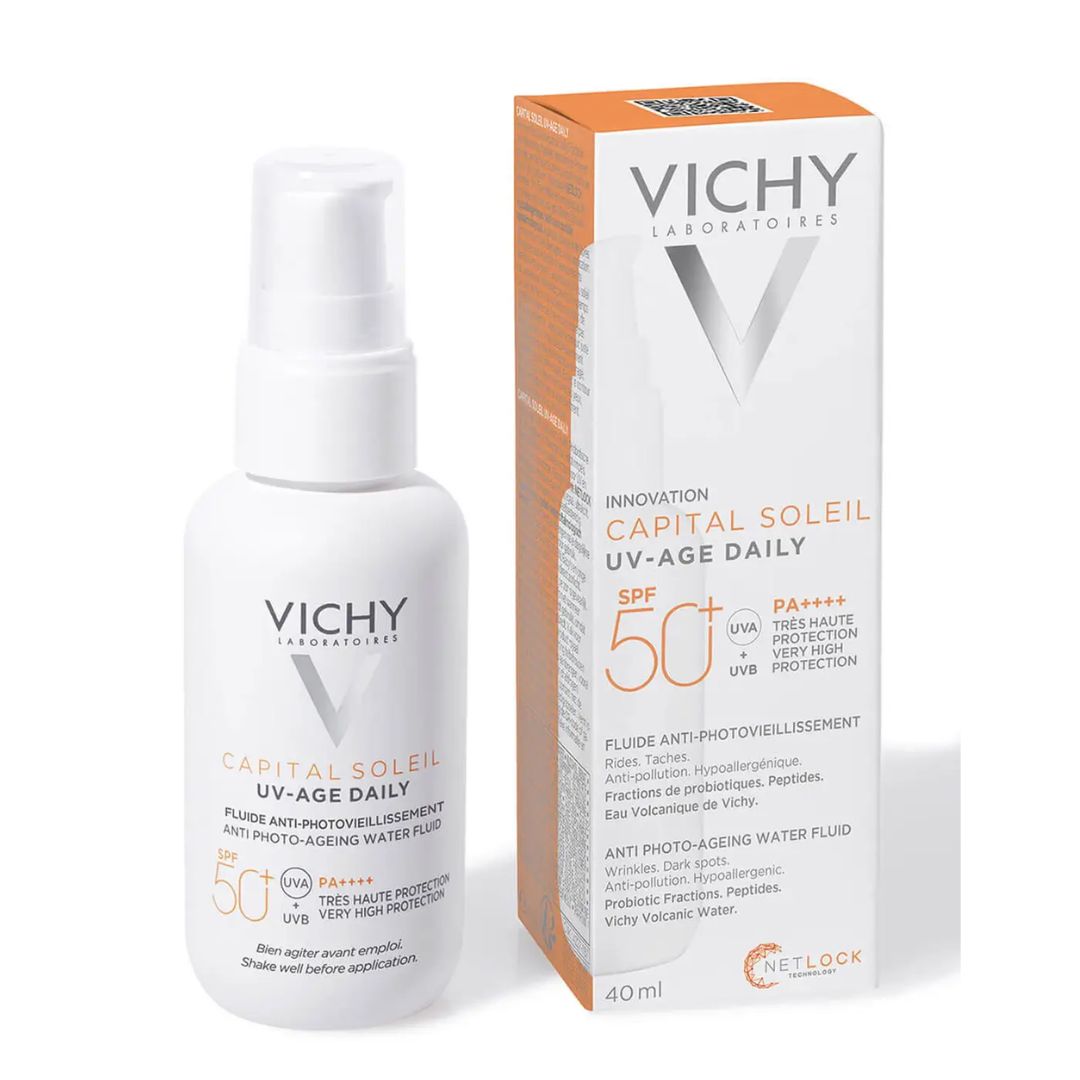
Vichy Capital Soleil UV Age Daily SPF50+
Reasons to buy
Reasons to avoid
"From the first time I tried this last year, I knew it was going to be a new favourite SPF for me. In consistency, it's very similar to the aforementioned La Roche-Posay Anthelios UVMune 400. The finish, however, is different. It doesn't have a matte finish and gives skin a healthy-looking glow. If you have dull skin that craves a radiance boost, this sunscreen will likely tick your boxes." - Shannon Lawlor, Executive Beauty Editor
7. SkinCeuticals Oil Shield UV Defense Sun Cream SPF50
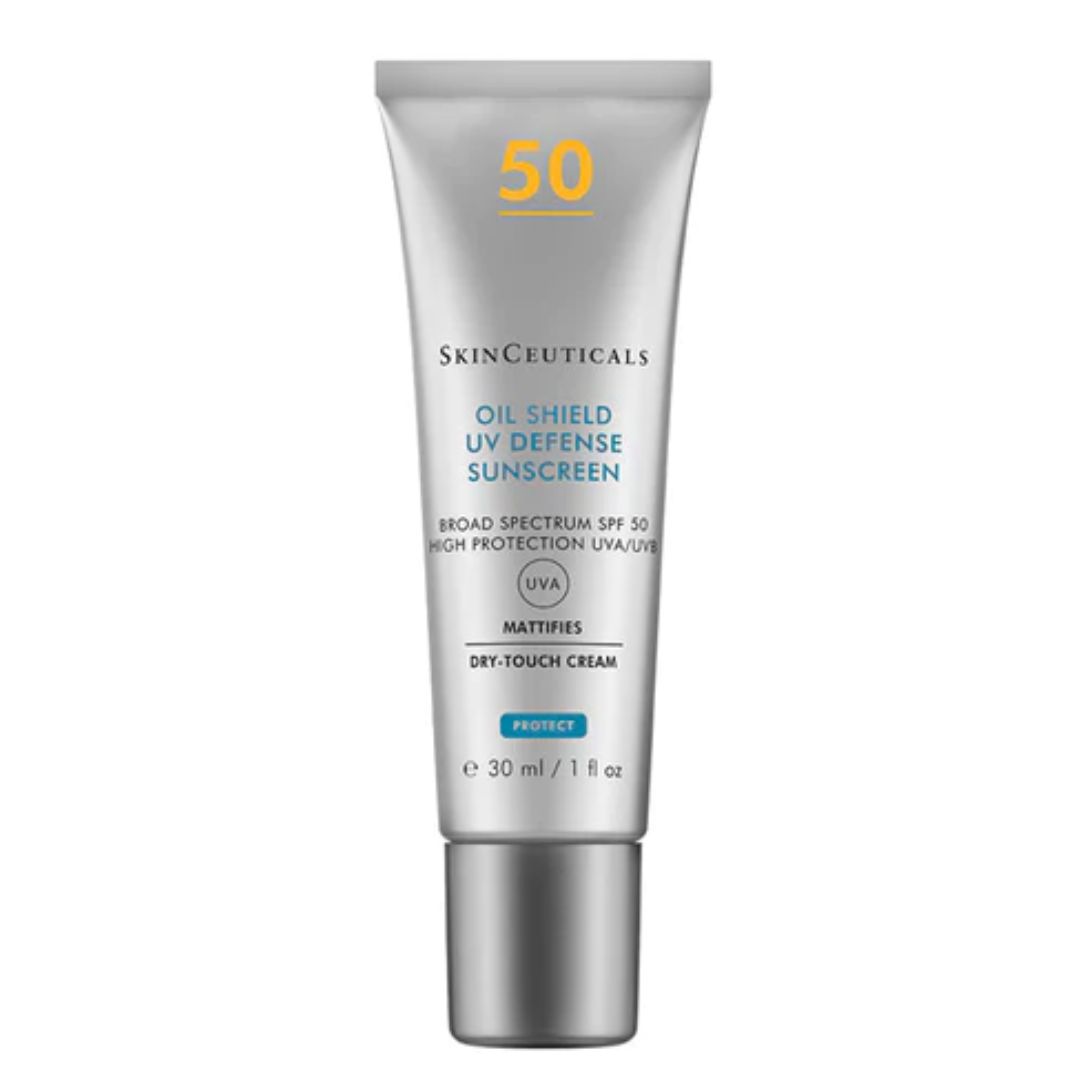
SkinCeuticals Oil Shield UV Defense Sun Cream SPF50
Reasons to buy
Reasons to avoid
"Another expert-loved product, this sunscreen from Skinceuticals has been a mainstay in my skincare routine for many years. Is it as joyful to use as some of the others on this list? No. It's not a fun product, but it does work. It leaves oily skin suitably mattified without dulling the complexion." - Shannon Lawlor, Executive Beauty Editor
8. Mecca Cosmetica To Save Face SPF50+
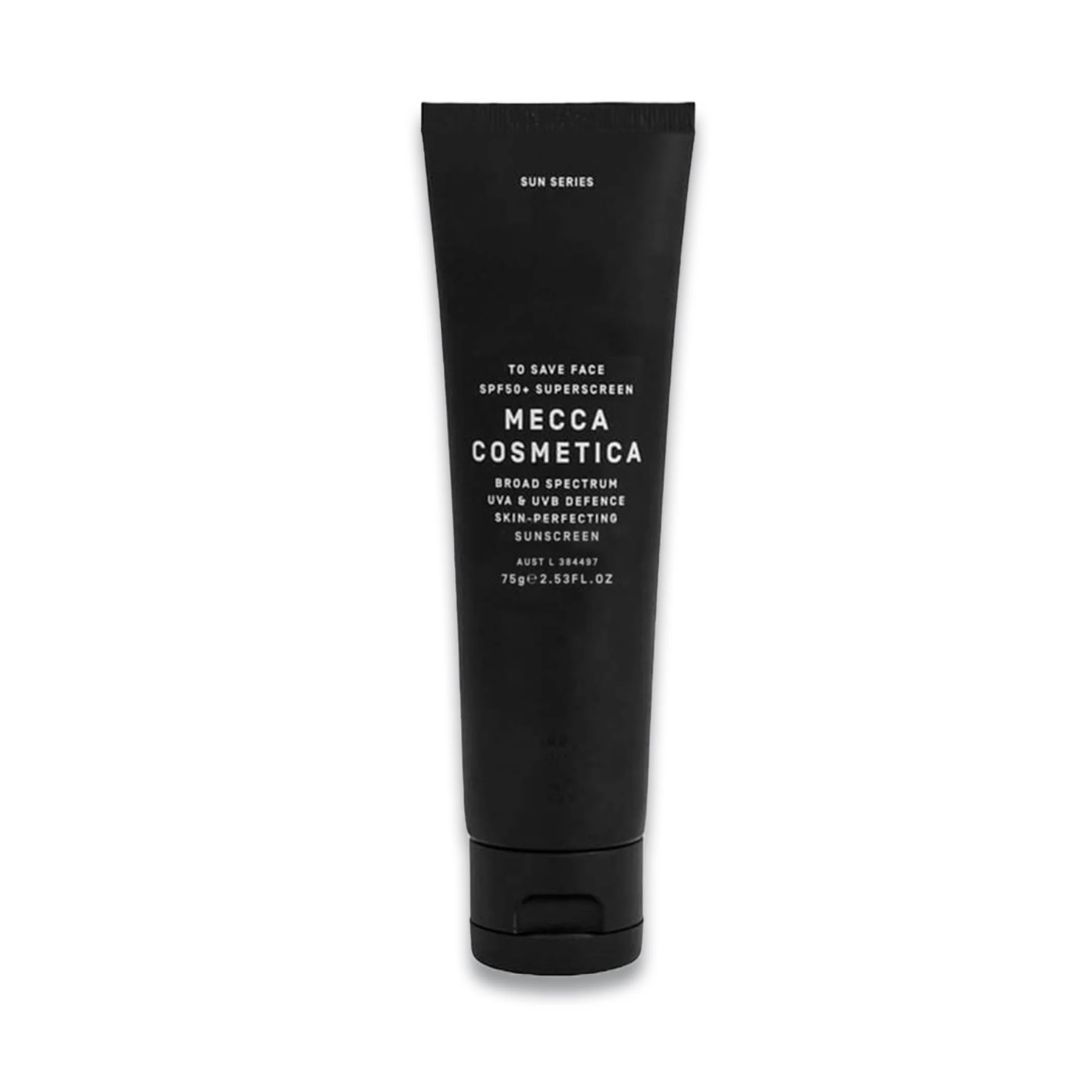
Mecca Cosmetica To Save Face SPF50+
Reasons to buy
Reasons to avoid
"This SPF has been my saving grace for the past five months. My skin has been in dire straits, with really severe hormonal cystic breakouts plaguing my chin and jaw area. When the weather is cold, my oily, acne-prone skin has a tendency to turn red and dry in some areas, meaning a creamier, more moisturising product for the daytime is required. This one is, hands down, the best daily SPF I have ever used. It's creamy enough to deliver some much needed hydration and glow, but it also sinks in almost instantly and doesn't leave any greasiness or residue (which typically exacerbates my breakouts). It is, in my opinion, one of the greatest skincare products I have ever used." - Shannon Lawlor, Executive Beauty Editor
9. Ultrasun Anti-Pigmentation Face Fluid SPF50+
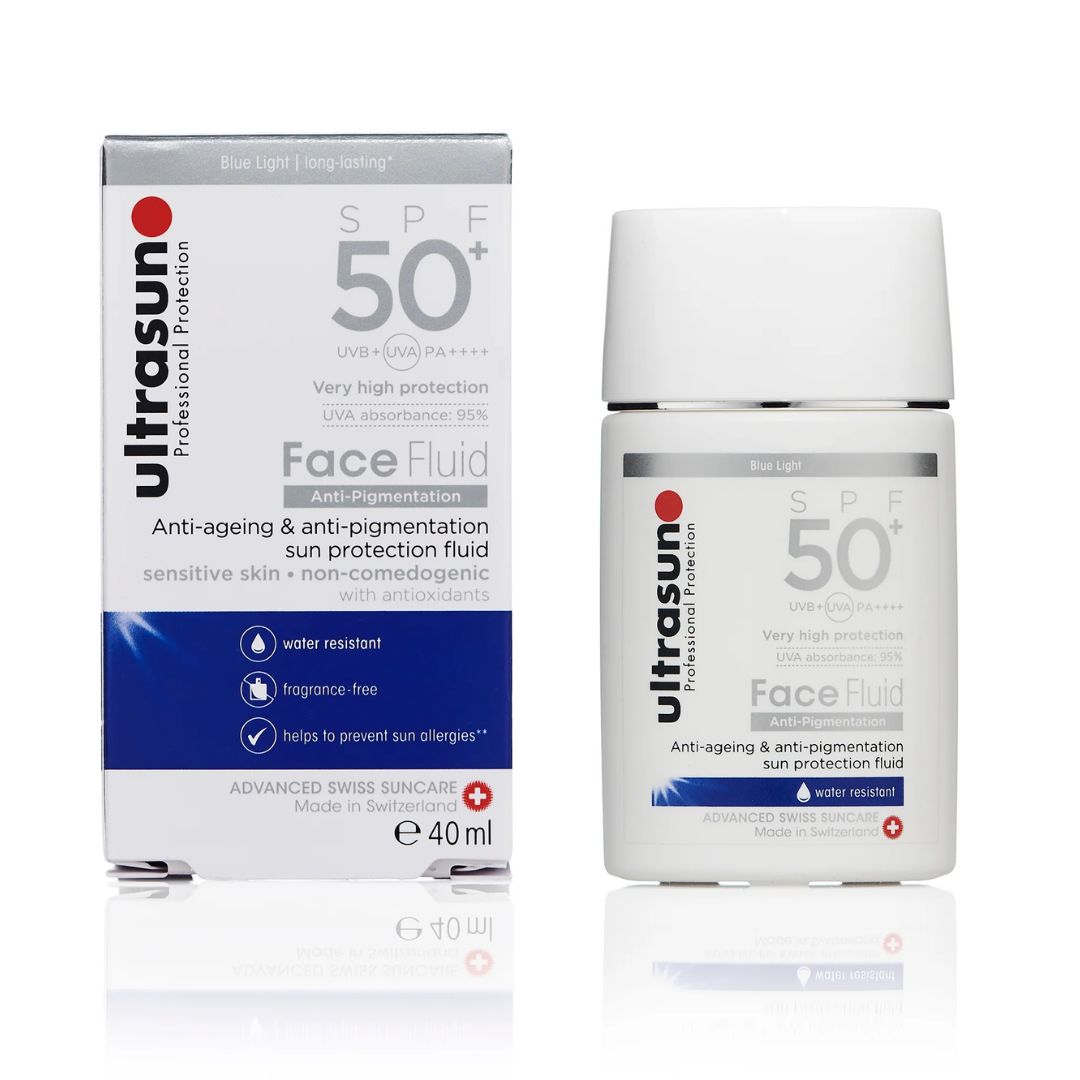
Ultrasun Anti-Pigmentation Face Fluid SPF50+
Reasons to buy
Reasons to avoid
"I always trust Ultrasun sunscreens – it's a brand that really takes sun protection seriously, and they're also pleasant to use. This fluid is light enough to use everyday as part of your skincare routine, yet also feels 'thorough' enough for sunny holidays. It's non-comedogenic (so won't block pores), suitable even for very sensitive skin, and contains ingredients that tackle pigmentation, whether that's caused by past sun exposure or post-acne marks." - Laura Mulley, freelance beauty editor
10. Clinique Superdefense City Block SPF 50
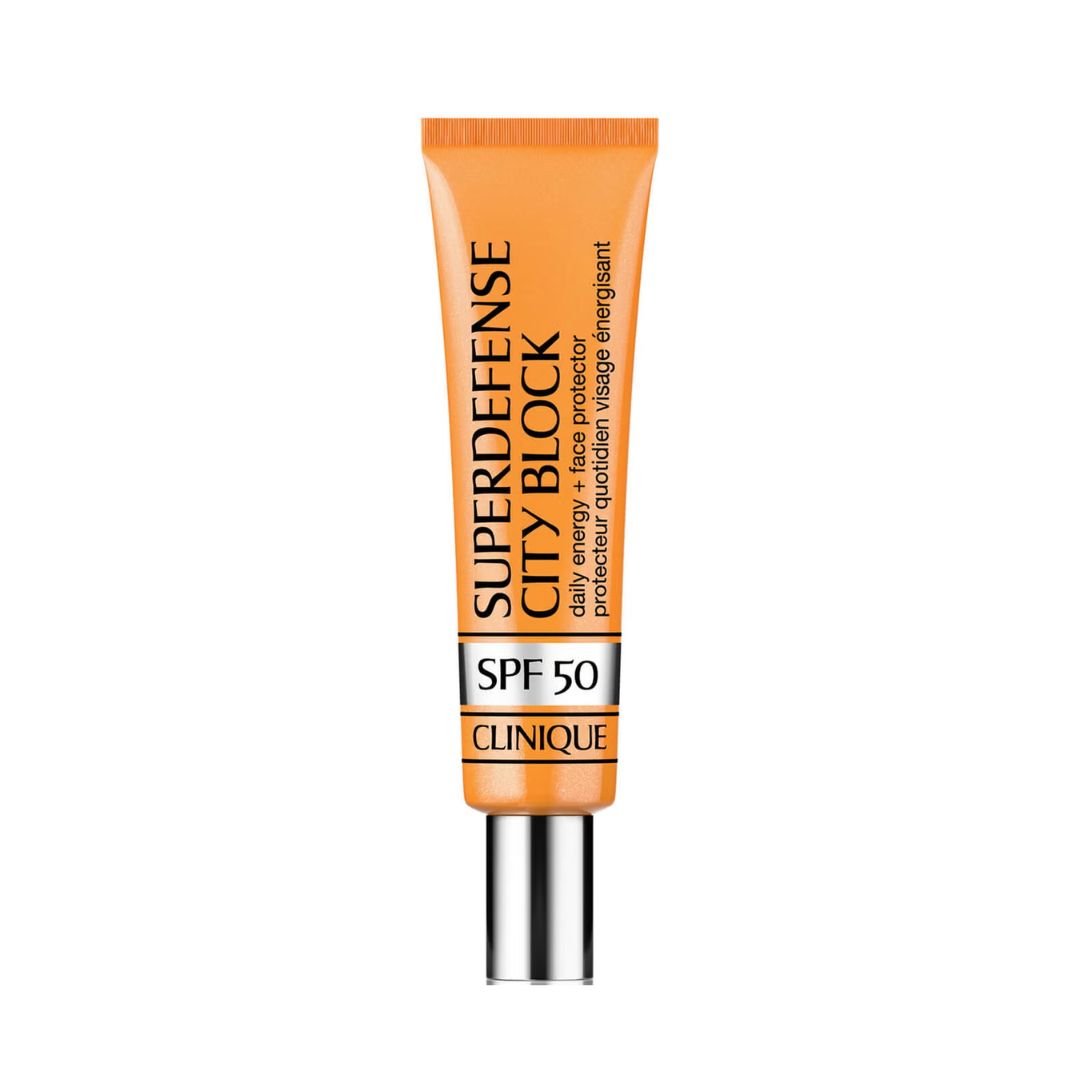
Clinique Superdefense City Block SPF 50
Reasons to buy
Reasons to avoid
"Despite having combination, acne-prone skin, I can’t *stand* mattifying moisturisers. They make my skin look dull and lifeless - absolutely not what I need on top of acne breakouts. Despite this Clinique moisturiser being oil-free, it doesn’t leave my skin looking matte, but has a skin-like and ever so tacky finish that makes the perfect base for make-up.
Oh, and obviously, it doesn’t break me out. Seriously, my skin is highly reactive and I’ve been using this stuff for over a decade. The formula is slightly tinted, which works well on my fair skin, giving it a sort of blurred effect - but it might not be suitable for deeper skin tones. This is literally the only thing that stops me from giving this SPF50 moisturiser a 10/10." - Valeza Bakolli, Junior Shopping Editor
Celebrity news, beauty, fashion advice, and fascinating features, delivered straight to your inbox!

Shannon Lawlor is the Beauty Director at Who What Wear UK. With nearly a decade of experience working for some of the beauty industry’s most esteemed titles, including Marie Claire UK, Who What Wear, Glamour UK, Stylist and Refinery29, Shannon’s aim is to make the conversation around beauty as open, relatable and honest as possible. As a self-confessed lazy girl, Shannon has an affinity for hard-working perfumes, fool-proof make-up products and does-it-all skincare.
- Laura MulleyBeauty Contributor